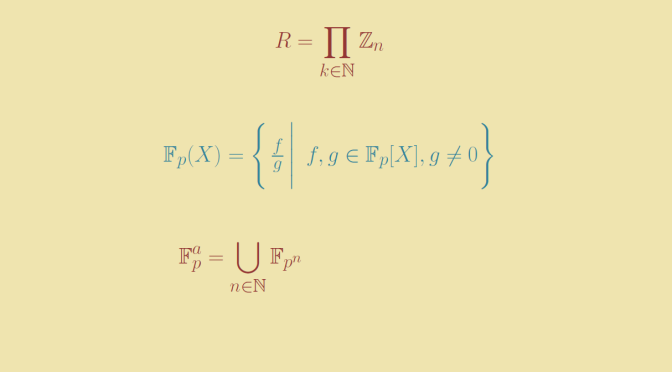Familiar to us are infinite fields whose characteristic is equal to zero like \(\mathbb Z, \mathbb Q, \mathbb R\) or the field of constructible numbers.
We’re also familiar with rings having infinite number of elements and zero for characteristic like:
- The rings of polynomials \(\mathbb Z[X], \mathbb Q[X], \mathbb R[X]\).
- The rings of matrices \(\mathcal{M}_2(\mathbb R)\).
- Or the ring of real continuous functions defined on \(\mathbb R\).
We also know rings or fields like integers modulo \(n\) (with \(n \ge 2\)) \(\mathbb Z_n\) or the finite field \(\mathbb F_q\) with \(q=p^r\) elements where \(p\) is a prime.
We provide below examples of infinite rings or fields with positive characteristic.
Infinite rings with positive characteristic
Consider the ring \(\mathbb Z_n[X]\) of polynomials in one variable \(X\) with coefficients in \(\mathbb Z_n\) for \(n \ge 2\) integer. It is an infinite ring since \(\mathbb X^m \in \mathbb{Z}_n[X]\) for all positive integers \(m\), and \(X^r \neq X^s\) for \(r \neq s\). But the characteristic of \(\mathbb Z_n[X]\) is clearly \(n\).
Another example is based on product of rings. If \(I\) is an index set and \((R_i)_{i \in I}\) a family of rings, one can define the product ring \(\displaystyle \prod_{i \in I} R_i\). The operations are defined the natural way with \((a_i)_{i \in I} + (b_i)_{i \in I} = (a_i+b_i)_{i \in I}\) and \((a_i)_{i \in I} \cdot (b_i)_{i \in I} = (a_i \cdot b_i)_{i \in I}\). Fixing \(n \ge 2\) integer and taking \(I = \mathbb N\), \(R_i = \mathbb Z_n\) for all \(i \in I\) we get the ring \(\displaystyle R = \prod_{k \in \mathbb N} \mathbb Z_n\). \(R\) multiplicative identity is the sequence with all terms equal to \(1\). The characteristic of \(R\) is \(n\) and \(R\) is obviously infinite.
Finally, consider and infinite set \(X\) and consider the ring \((R, \Delta, \cap)\) where \(R=\mathcal{P}(X)\) is the power set of \(X\), \(\Delta\) the symmetric difference (used as addition) and \(\cap\) the intersection (used as multiplication). Once can prove that \((\mathcal{P}(X), \Delta, \cap)\) is a ring where \(X\) is the multiplicative identity. The characteristic of \(R\) is equal to \(2\) as \(X \Delta X = \emptyset\).
Infinite fields with positive characteristic
For our first example of an infinite field having a positive characteristic, we consider \[\mathbb{F}_p(X)=\left\{\,\frac{f}{g}\,\Bigg|\,\,\,f,g\in\mathbb{F}_p[X], g\neq0\right\},\] the rational functions in the indeterminate \(X\) with coefficients in \(\mathbb{F}_p\) where \(p\) is a prime. The field \(\mathbb{F}_p(X)\) is infinite as it contains \(1, X, X^2, \dots \) and it is of characteristic \(p\) because it contains \(\mathbb{F}_p\) (alternatively, because the kernel of the unique ring homomorphism \(\mathbb{Z} \to \mathbb{F}_p(X)\) is \(p \mathbb{Z}\)).
Our second example is \[\mathbb{F}_p^a=\bigcup_{n \in \mathbb N} \mathbb{F}_{p^n},\] the algebraic closure of \(\mathbb{F}_p\). The main arguments to prove that \(\bigcup_{n \in \mathbb N} \mathbb{F}_{p^n}\) is the algebraic closure of \(\mathbb{F}_p\) are the following ones. Let \(q=p^n\). Then \(\mathbb{F}_p^a\) contains a unique splitting field of \(f(X) = X^q-X\) over \(\mathbb{F}_p\). Let \[K = \{\alpha \in \mathbb{F}_p^a \, | \, f(\alpha)=0\}.\] Then \(K\) is a field. The polynomial \(X^q-X\) is separable since its derivative is equal to \(-1\). Hence \(K\) has \(q\) elements. Therefore \(K\) is the finite field with \(q\) elements. Conversely, let \(a\) be algebraic over \(\mathbb{F}_p\) with \([\mathbb{F}_p(a):\mathbb{F}_p]=n\). Then \(\mathbb{F}_p(a)\) has \(p^n\) elements. Hence \(a \in \mathbb{F}_{p^n}\).

